You searched for: ������������������������������������������������cxfk69���page
<< Previous | Displaying results 11-20 of 177 for "������������������������������������������������cxfk69���page" | Next >>
-
Page of International Military Tribunal program
ArtifactFloor plan of the courtroom. The plan appeared in a mimeographed program booklet distributed at the International Military Tribunal at Nuremberg. 1945.
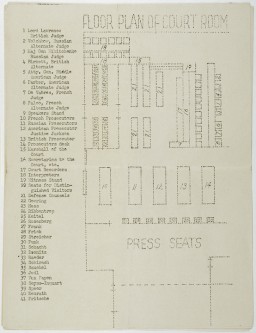
-
Beifeld album page showing countryside
ArtifactView of the countryside in Csobanka, Hungary, as the Hungarian Labor Service company 109/13 departs on the morning of April 20, 1942. [Photograph #57952]
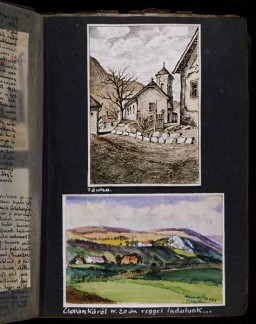
-
Beifeld album page about conditions
Artifact(Middle, left and bottom) In the drawing at the middle, left, Hungarian soldiers use an ax to cut up a dead horse in order to get meat to sustain themselves. The image at the bottom, titled "The Long Trip, February 1943," shows a Hungarian soldier walking along a road past a dead horse and an abandoned harrow that is half buried in the snow. [Photograph #58110]
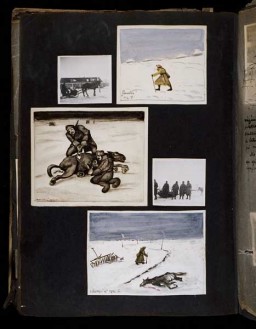
-
Page from Otto Wolf's diary
PhotoOtto Wolf (1927-1945) was a Czech Jewish teenager who chronicled his family's experience living in hiding in rural Moravia during World War II. His diary was published posthumously. This image shows book 4 of Otto Wolf's diary. This is the first entry by Felicitas Garda (Otto Wolf's sister) dated April 17, 1945. Felicitas continued Otto's diary after his disappearance.
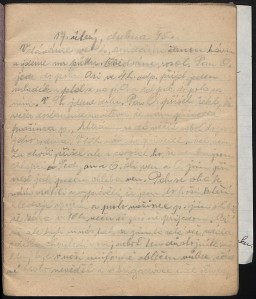
-
Pages from Stanislava Roztropowicz's Diary
Media EssayDiaries reveal some of the most intimate, heart-wrenching accounts of the Holocaust. They record in real time the feelings of loss, fear, and, sometimes, hope of those facing extraordinary peril. Stanislava Roztropowicz kept a diary from 1943-1944...
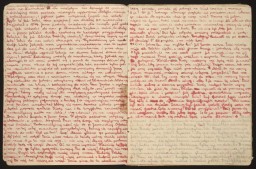
-
A page from the Fenyves family cookbook
ArtifactSteven Fenves (born Fenyves) and his family lived in Subotica, Yugoslavia. His father, Lajos, managed a publishing house and his mother, Klári (Klara), was a graphic artist. In April 1941, Subotica fell under Hungarian occupation. Until May 1944, the Fenyveses lived in one corner of their apartment while Hungarian officers took over the rest of the family’s home. In March 1944, Germany occupied Hungary. In April, Lajos was deported to the Auschwitz camp in German-occupied Poland. Steven, his sister…
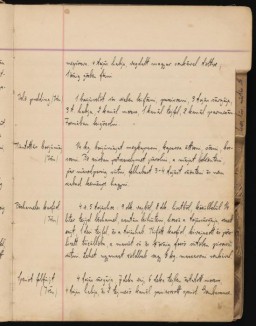
-
First page of Eva Ostwalt's cookbook
ArtifactEva Ostwalt was born in Cologne, Germany, to Jewish parents. She had two younger sisters, Kate and Trude. In 1927, Eva moved with her daughter, Heidemarie, and non-Jewish husband to Dresden. Eva and Karl later divorced, and Eva received custody of Heidemarie. Mother and daughter moved to Merano, Italy. When Eva’s passport expired in 1938, she had to return to Germany. Believing that Heidemarie would be safer with her father, Eva gave custody back to Karl in Dresden. Eva returned to Cologne, where both…
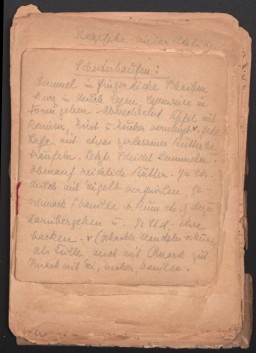
-
Page from Stanislava Roztropowicz's diary
ArtifactStanislava Roztropowicz kept a diary from 1943-1944. In it, she describes her family's decision to hide an abandoned Jewish girl, Sabina Heller (Kagan). Sabina Kagan was an infant when SS mobile killing squads began rounding up Jews in her Polish village of Radziwillow in 1942. Her parents persuaded a local policeman to hide the family. The policeman, however, soon asked the Kagans to leave but agreed to hide baby Sabina. Her parents were captured and killed. Sabina was concealed in a dark basement,…

-
Beifeld album page titled "Mementos"
ArtifactCollage entitled: "Mementos from the Russian campaign," which includes a watercolor of Stalin with the caption: 'Russia a meeting place for foreigners 1942-43' (top); a commuter train ticket issued to military personnel who carried the special SAS [Hurry, Immediate, Urgent] draft notice (middle, right); a pseudo travel brochure cover entitled 'Spend your summer vacation in merry Russia' (bottom, left); and the original design for the cover of the labor company's journal entitled 'Hungarian Royal 109/13…
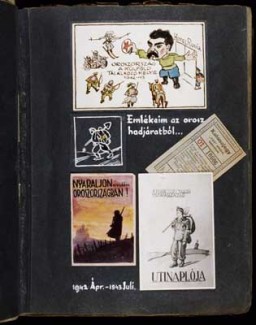
-
Page from Otto Wolf's Diary
Timeline EventApril 17, 1945. On this date, Felicitas Wolf wrote her first entry in her brother Otto's diary after his disappearance.

